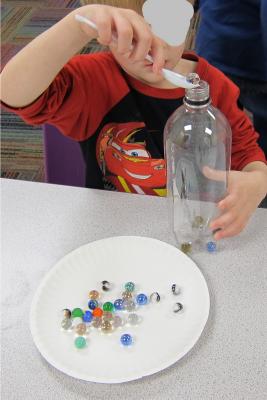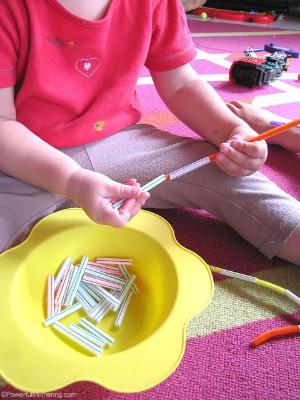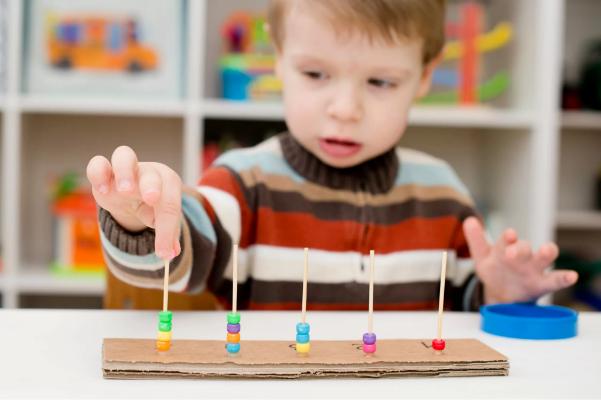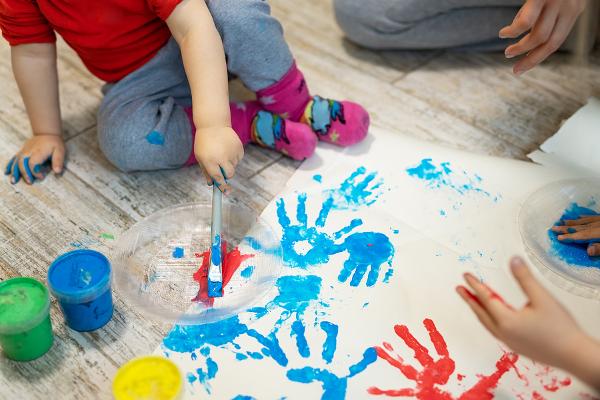Fine motor activities are crucial for young children’s development from preschool through age 7. These activities focus on refining the coordination and control of small muscles, particularly those in the hands and fingers. Children improve their hand-eye coordination, skill, and precision by threading beads, cutting with scissors, and manipulating small objects.
These skills are fundamental for writing, drawing, and buttoning clothes. Engaging in fine motor activities enhances physical abilities and fosters children’s cognitive development, problem-solving, and creativity.
| For toddler learning there is a wide range of activities which play a crucial role in their development and each impact different like Easter Egg Activities, Daycare Fall Activities For Toddlers, Hopscotch Game and Toddler Art Projects. |
Why Are Fine Motor Skills Important?
Fine motor skills are pivotal for children’s development, encompassing the coordination and control of small muscles, particularly the hands and fingers. These skills form the foundation for essential tasks such as writing, drawing, and manipulating objects, integral to academic success and self-expression.
Proficiency in fine motor skills facilitates independence in self-care activities like dressing and feeding, fostering a sense of autonomy and confidence in children. Moreover, well-developed fine motor skills contribute to the refinement of handwriting, enabling precise and legible communication.
Fine motor activities strengthen hand muscles and stimulate cognitive development, enhancing problem-solving skills and spatial awareness. Cultivating fine motor skills empowers children to navigate and interact with their environment effectively, promoting holistic growth and development.
Fine Motor Activities For Kindergarten Toddlers And Preschoolers
Kindergarten children typically follow a structured curriculum with set learning objectives and activities, including motor skill development, guided by teachers.
In contrast, unschooling for kindergarten focuses on child-led learning experiences where children can explore their interests and learn through everyday experiences, potentially incorporating motor activities more spontaneously and self-directedly.
Fine Motor Activities for Kindergarten (Homeschooling)

Playdough Creations
Enhance hand strength and coordination while fostering creativity and imagination.
Letter Tracing
Develop pre-writing skills and reinforce letter recognition through tactile learning.
Button Sorting
Refine finger dexterity and hand-eye coordination while learning basic math concepts like sorting and classification.
Scissor Practice
Improve cutting skills and hand control by cutting along lines or patterns.
Pom-Pom Sorting
Enhance fine motor skills and color recognition through sorting pom-poms into matching colored cups or containers.
Stringing Pasta
Strengthen hand muscles and improve hand-eye coordination by threading pasta onto string or pipe cleaners.
Dot Marker Art
Develop fine motor control and creativity by using dot markers to create pictures or patterns.
Threading Beads
Improve hand-eye coordination and concentration while threading beads onto strings or pipe cleaners to create jewelry or patterns.
Playdough Letter Stamping
Reinforce letter recognition and fine motor skills by stamping alphabet letters into playdough using stamps or cookie cutters.
Clothespin Matching
Enhance fine motor skills and promote concentration by matching and clipping clothespins onto matching cards or objects.
Fine Motor Activities for Preschool (Homeschooling)

Sensory Bin Exploration
Stimulate sensory experiences and fine motor development through exploring materials like rice, beans, or water with scoops, spoons, and cups.
Nature Collage
Foster creativity and fine motor skills by collecting natural materials like leaves, sticks, and flowers to create collages or artwork.
Doughnut Hole Counting
Develop fine motor skills and math concepts by using tongs or tweezers to transfer doughnut holes into numbered cups according to quantity.
Pattern Block Puzzles
Enhance spatial awareness and fine motor skills by manipulating pattern blocks to complete colorful puzzles or designs.
Fruit Kabob Making
Improve hand-eye coordination and promote healthy eating habits by threading fruit onto skewers to create colorful and tasty snacks.
Tape Resist Art
Encourage creativity and fine motor skills by creating designs or pictures using painter’s tape and then painting over it before removing the tape to reveal the design.
Button Snake
Strengthen fine motor skills and promote buttoning skills by threading buttons onto a ribbon or string to create a “button snake.”
Pincer Grasp Practice
Enhance pincer grasp and hand strength by using tweezers or tongs to transfer small objects like beads or pom-poms from one container to another.
DIY Threading Cards
Improve hand-eye coordination and fine motor skills by punching holes in cards and providing shoelaces or yarn for children to thread through the holes.
Sock Matching
Develop fine motor skills and promote independence by matching and rolling pairs of socks together.
20 Fine Motor Activities For 3 To 7 Years Old

Here are the 20 fine motor activities:
Playdough Creations
Let children mold and shape playdough to enhance hand strength and creativity.
Finger Painting
Encourage kids to explore colors and textures through finger painting, refining their pincer grip.
Threading Beads
Provide beads and strings for threading, promoting hand-eye coordination and concentration.
Scissor Cutting
Offer child-safe scissors for cutting paper or straws to improve cutting skills and hand control.
Sticker Collage
Allow children to peel and place stickers to create collages, refining fine motor skills and creativity.
Lego Building
Engage kids in building structures with Lego blocks to enhance hand-eye coordination and spatial skills.
Button Sorting
Let children sort buttons by size, shape, or color, promoting fine motor skills and basic math concepts.
Drawing with Chalk
Provide chalk for drawing on sidewalks or chalkboards, encouraging wrist movements and creativity.
Pincer Grasp Practice
Offer small objects like beads or pom-poms for picking up with thumb and index finger to strengthen the pincer grasp.
Play with Lacing Cards
Provide lacing cards for threading and lacing, improving hand-eye coordination and fine motor skills.
Paper Folding
Teach children simple origami or paper folding activities to enhance hand dexterity and concentration.
Puzzles
Offer age-appropriate puzzles for children to solve, improving fine motor skills and problem-solving abilities.
Cutting Playdough with Plastic Knives
Encourage kids to use plastic knives to cut playdough, refining cutting skills in a safe manner.
Tongs and Tweezers Play
Provide tongs or tweezers for transferring small objects, promoting hand strength and precision.
Dot-to-Dot Drawing
Offer dot-to-dot drawing sheets for children to connect and draw, enhancing hand-eye coordination and pencil control.
Tracing Shapes
Provide tracing worksheets with shapes for children to trace, improving pencil grip and control.
Beading with Pipe Cleaners
Offer pipe cleaners and beads for threading, strengthening hand muscles and coordination.
Hammering Golf Tees
Provide a soft surface and golf tees for hammering with a toy hammer, enhancing hand-eye coordination and wrist movement.
Tearing Paper Collage
Offer colorful paper for tearing and gluing onto a collage, improving hand strength and creativity.
Play with Playfoam
Provide Playfoam for squishing, squeezing, and molding, enhancing hand strength and sensory exploration.
Bottom Line
Through activities such as drawing, cutting, and manipulating objects, children refine these skills, which are essential for academic success, self-care, and overall independence. By engaging in fine motor activities, children not only strengthen hand muscles but also stimulate cognitive development, fostering problem-solving skills and creativity. Cultivating these skills empowers children to navigate their environment confidently, setting the stage for lifelong learning and achievement.

